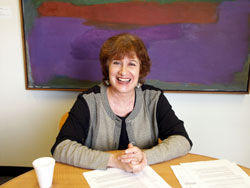Focus on faculty-student interaction
![]()
| 24 September 2003
| |  Vice Provost for Undergraduate Education Christina Maslach Bonnie Azab Powell photo |
Less than three weeks into the start of this school year, freshman Alexsandr Danielyan had already called on his astronomy professor, Alex Filippenko, during office hours. They discussed quantum theory for about 45 minutes, and, as Danielyan recounts happily, the renowned supernova hunter even complimented him on an insight. “It was cool,” said the student. “During office hours, you can debate ideas with him without taking time away from your 800 other classmates.”
Danielyan’s confidence is unusual among freshmen. Most first- and second-year students say they are too intimidated to drop in on professors during their office hours, reports Christina Maslach. As Vice Provost for Undergraduate Education, she has made improving faculty-student interaction a major mission. And in Maslach’s other role as a professor of psychology, she explores the issue through a Freshman Seminar she is teaching for the second time called “Getting to Know the UC Berkeley Faculty.”
The 15 first-year students in the seminar are charged with figuring out how Berkeley’s faculty and students can maximize their time together. During the the course, Maslach hopes that students will engage with faculty while also learning the ropes of research into human behavior: how to identify behavioral patterns, develop a hypothesis, figure out what evidence to gather, and develop conclusions.
A self-fulfilling prophecy
Last year’s seminar students postulated, based on their own experience, that students were too shy to talk to their professors, that they feared they would have nothing intelligent to say. That perception can make for a self-fulfilling prophecy, warns Maslach: “If you assume someone is brilliant and intimidating, you’re much more careful about the questions that you ask, so you end up with no conversation.”
For the freshmen currently in her seminar, improving their own skills with faculty appears of paramount importance. In the initial class meeting, Maslach asked the students to write down their reasons for taking the course: among the answers were “to gain confidence,” “get over insecurity,” and “so I won’t be just a number to my professors.”
These students already understand something important, says Maslach — that getting to know one’s professors has long-term advantages. “When you connect with a faculty member, the whole education process becomes more vital and engaging. Rather than just giving you a grade, a professor can give you advice about choosing a major, involve you in his or her research projects, counsel you about summer opportunities, and write letters of recommendation for jobs or grad school.” But, she explains, “they can’t do a good job of recommending you if they don’t know you.”
An excellent route to that familiarity is to work with a faculty member on research, such as through the Undergraduate Research Apprentice Program (URAP), in which students get credit for working as a research assistant. Often, the student’s ties to the lab or department will extend long beyond the end of the URAP position. “The continuity of the relationship is valuable,” says Maslach. “With a research relationship, students are working with the professor longer, and they have the chance to discuss all kinds of topics, which they can’t in a class setting.”
What they say vs. what they do
In a survey of students last spring, 80 percent of graduating seniors said they thought it was important to work on research with a faculty mentor. However, less than half of them reported actually having done so. “Although the lack of student-faculty contact has always been a key issue at large research institutions, not just ours, there’s a gap we still need to address,” acknowledges Maslach.
By encouraging students to approach faculty, and rewarding faculty who reach out to students, Berkeley is working to close both sides of that gap. The College of Letters and Science, for example, honors five individual faculty members annually with Distinguished Research Mentor awards for exceptional service as research mentors for undergraduate students. It also bestows Distinguished Adviser awards to professors who have offered outstanding counsel to undergraduates about their professional and academic careers.
Integrative biology professor Robert Full believes that research mentorships can be mutually beneficial to both student and professor, and that’s why he actively recruits undergraduates to work in his PolyPEDAL Laboratory.
“I give guest lectures to other departments, and tell students about all the huge ways that other undergraduates have contributed to my research,” he explains. “Granted, they still have a huge amount of education ahead of them, but right now they bring a unique perspective: they don’t know what shouldn’t be possible, so they come up with novel suggestions and ideas. Treating them as colleagues as early as possible also gets them motivated and excited about learning. We professors should remember that if someone hadn’t done that for us, we wouldn’t be here.”

